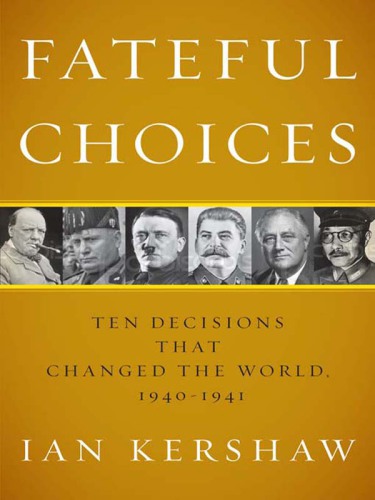
Fateful Choices
Ten Decisions That Changed the World, 1940-1941
کتاب های مرتبط
- اطلاعات
- نقد و بررسی
- دیدگاه کاربران
نقد و بررسی

March 19, 2007
Tracing the thought processes behind crucial turning points in WWII's most crucial 19 months, Kershaw, the author of a major biography of Hitler and professor of modern history at the University of Sheffield, reminds us that nothing in that titanic struggle was predetermined. Events might have run a very different course had Great Britain decided to negotiate peace with Hitler in June 1940, or if Japan had attacked the Soviet Union from the east as Germany invaded from the west in June 1941. Kershaw shows that Germany's war on two fronts and Japan's bombing of Pearl Harbor, though ultimately disastrous for those countries, were the results of chains of reasoning based on political and military goals, however despicable. Though the author makes deep, intelligent use of archival materials, he provides little new information. Rather, his analysis focuses on the structure of decision making and its consequences. Kershaw depicts Germany, Italy and the Soviet Union as severely hampered by one man giving the orders, getting input only from subordinates too fearful to say anything he didn't want to hear. The slower democratic process enabled many voices to be heard and better informed judgments to be made by Churchill and Roosevelt. This subtext adds a note of hope to a text depicting one of humanity's darkest periods.

April 15, 2007
From May 1940 to December 1941, six world leaders arrived at key decisions that heavily affected the outcome of World War II. How were these decisions reached? What influenced these decisions? Rather than writing what he would call a "counter-factual," or speculative, history, Kershaw explores whether or not such decisions were inevitable and identifies other options and their possible outcomes. He deftly examines the decision-making processes of the six major powers from the perspective of the key players. What other options existed for Mussolini other than invading Greece in 1940? How did his decision to invade affect the outcome of the war for Italy? How did the British war cabinet decide to continue the fight against Germany after the defeat of France when many argued for negotiated settlement? How did public opinion shape Roosevelt's actions, or inactions, during the war? Thoroughly researched and highly engaging, Kershaw's book confidently leads readers through the decisions while showing that history is not inexorable. Highly recommended for academic and larger public library collections. [See Prepub Alert, "LJ" 2/15/07.]Patti C. McCall, Albany Molecular Research, NY
Copyright 2007 Library Journal, LLC Used with permission.

























دیدگاه کاربران